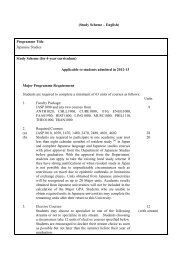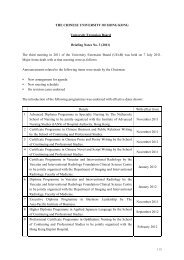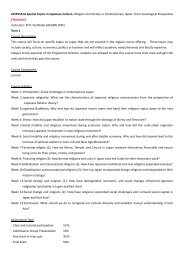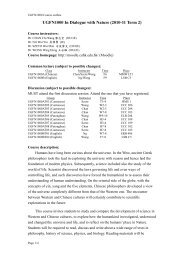ä¸è¼å ¨æ¸ - The Chinese University of Hong Kong
ä¸è¼å ¨æ¸ - The Chinese University of Hong Kong
ä¸è¼å ¨æ¸ - The Chinese University of Hong Kong
Create successful ePaper yourself
Turn your PDF publications into a flip-book with our unique Google optimized e-Paper software.
Susan Gano-Phillips, Affective Learning in General Education<br />
<br />
affective involvement. However, in addition to cognitive goals, there may<br />
be good reason to consider affective learning in its own right. Consider, for<br />
a moment, the independent contributions <strong>of</strong> the domains <strong>of</strong> learning in the<br />
following example: delivering a motivational speech. It is the interaction <strong>of</strong><br />
cognitive learning outcomes (e.g., knowledge <strong>of</strong> organizational strategies<br />
within a speech, application <strong>of</strong> strategies for persuading others), affective<br />
learning outcomes (valuing the activity and demonstrating its value through<br />
perseverance with the task <strong>of</strong> speech writing and delivery), and psychomotor<br />
learning outcomes (e.g., modulation <strong>of</strong> voice, use <strong>of</strong> nonverbal gestures)<br />
that determine the overall effectiveness <strong>of</strong> the speech. Failing to consider<br />
any one <strong>of</strong> the domains <strong>of</strong> learning would not allow a student to deliver the<br />
speech with the same effectiveness. Individuals may have the capacity for<br />
effective action (e.g., knowledge <strong>of</strong> how to give the speech) while lacking the<br />
motivation to act. Cognitive and affective learning, while complementary,<br />
are not completely overlapping domains, as cognitive outcomes focus upon<br />
what students learn while affective outcomes focus upon what students learn<br />
to value (Shephard, 2008).<br />
Further challenges to working with affective learning arise from<br />
difficulties in precisely stating desired affective learning outcomes because<br />
they involve opinions, beliefs, and attitudes (Bloom et al., 1956; Smith &<br />
Ragan, 1999). <strong>The</strong> absence <strong>of</strong> clearly stated affective learning outcomes makes<br />
the assessment <strong>of</strong> those outcomes more challenging. Attitudes and values,<br />
as internal states, cannot be assessed in the same ways as physical/overt<br />
behaviors such as a person’s skill at playing the piano or titrating chemicals,<br />
nor can they necessarily be assessed in the same ways as cognitive outcomes

















